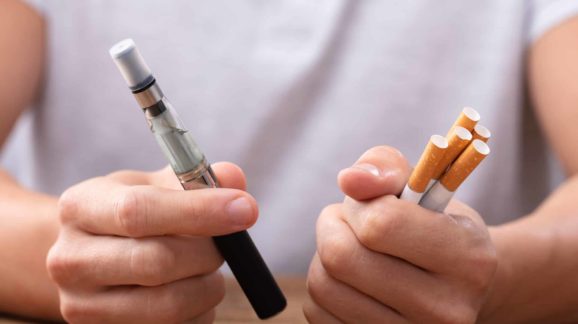It’s up to Drug Reformers to Stop the War on Nicotine

Photo Credit: Getty
In recent years, a growing number of Americans have been waking up to the failure of the War on Drugs. Officially initiated by President Richard Nixon in the 1970s, the War on Drugs did not protect the country from substance use and perversely caused greater harm to health and welfare of many, specifically people and communities of color who have borne the brunt of its carceral effects.
This realization has led to a rising movement aimed at ending the War on Drugs and approaching the use of substances like cannabis, opioids, and injectable drugs with compassion rather than stigma or violence. At the same time, however, anti-drug warriors have been ramping up the campaign to ban, prohibit, and criminalize the use of another substance—recreational nicotine—with little pushback. Unless drug war reformers take swift action, nicotine will become the new front in the War on Drugs, perpetuating the injustices they are so desperately trying to correct.
As I argued in a video presentation for the upcoming Global Forum on Nicotine, all of the substances that eventually became part of the War on Drugs followed a similar evolution in how they were perceived by the media, the public, and ultimately treated by authorities. The evolution in how American society has viewed the use of tobacco and now nicotine vapor seems to be following this same pattern of moral panic (myopically focused on children), sensationalism, and the eventual demonization and criminalization of users. Though the issue of recreational nicotine use (smoking and vaping as opposed to the use of nicotine replacement therapies) has not yet reached the problematic heights achieved by other substances, it seems to be heading in that direction.
Last weekend, four young men were arrested in Ocean City, Maryland, with one man tasered by police (despite appearing to comply with their orders), as revealed by footage of the encounter filmed by bystanders. The encounter began, according to the police, because some members of the group were “vaping” on the boardwalk, an act prohibited by local ordinances. Violation of the ordinance can lead to a $500 fine, but in this case, it led to the tasering incident, arrests, and allegations of police brutality.
This is not the first time that police have used alleged violations of tobacco laws to initiate encounters with people of color, ending in violence, arrests, or worse. The most famous, perhaps, was the killing of Eric Garner, suffocated by New York City police officers who suspected him of selling untaxed cigarettes on the street. There are countless other examples, including Sandra Bland, who was arrested by a Texas state trooper after she refused to put out the cigarette she was smoking during a traffic stop and later died in prison. Just last year, police in Rancho Cordova, California, found themselves in hot water after video of an officer brutally beating 14-year-old Elijah Tufono surfaced. The reason for the encounter? Tufono, a minor, allegedly purchased a Swisher cigar. A few months later, a police officer in La Mesa, California, approached Amaurie Johnson, who had been quietly smoking a cigarette while waiting for his friend outside of a trolley station. The officer questioned Johnson, repeatedly shoved him, and arrested him for violation of the city’s recently enacted ban on public tobacco use.
With cities and states across the country enacting increasing restrictive rules on smoking and vaping, raising taxes, and prohibiting certain types of products (including banning flavored e-cigarettes and the proposed ban on menthol cigarettes), such encounters will only increase as authorities seek to enforce bans and stamp out the illicit markets that always rise to meet demand. And these new tobacco “offenses” may provide a convenient substitute for cops no longer able to use the old “I smell pot” pretext to stop and arrest people of color.
Unfortunately, few of those pushing for the “newer and softer” approach to substance use issues are willing to extend that same consideration to tobacco. Some activists have actually advocated for harsher laws that, despite the intent or claims to the contrary, will almost certainly result in negative encounters between the police and people of color. However, most within the drug reform and tobacco control communities have simply ignored the obvious parallels and likely consequences of a War on Drugs for nicotine.
If we genuinely want to bring an end to draconian drug laws, minimize encounters with law enforcement, and create a society that treats substance users—regardless of what they use—with respect instead of violence, we must make sure the effort to prevent diseases related to smoking doesn’t turn into a “war” on nicotine and the people who use it.